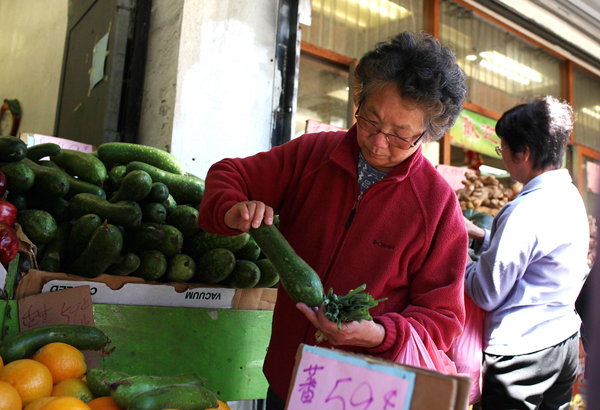The 'Gold Mountain'
With China's emergence as an economic power, more overseas Chinese may be seeing their home country as "Gold Mountain" - a nickname applied to the US during the Gold Rush days. But Madeleine Sumption, a senior analyst at the Migration Policy Institute in Washington, believes China's growing wealth may actually be a driver of emigration. There has been evidence of immigrants returning to China after living in the US, but mostly among higher-educated Chinese, she said.
For lower-income immigrants (who are more likely to live in a traditional Chinatown), economic prospects still remain more attractive in the US, according to MIT professor Lee.
 |
|
A customer examines the produce at a market in Chinatown in San Francisco. [Photo/Agencies] |
"Income inequality is still pretty large in China, and in the rural areas there are fewer opportunities," he said. "I think that both the higher- and lower-income immigrant groups here in the US will continue to grow. There is a continued influx of working-class Chinese people coming into the US, and there will continue to be a need for places like Chinatown."
Abramson pointed to cities in China such as Fuzhou, in the east coast province of Fujian, that have a long history of sending people to the US.
"It's part of the culture and tradition," he said. "But now people are here, and it's difficult to go back once their children have been raised here and they end up living a transnational kind of life. There is improved mobility now, and instead of people leaving China for a short period to make money and then going back to live out the rest of their lives in China, they travel back and forth and end up having lives on both sides."
In Swider's view, traditional Chinatowns will continue "because the ethnic enclave plays an important economic role in offering opportunities to migrants with capital to invest and in providing lower-skill- and language-level migrants with jobs".
Abramson agreed: "As long as migration doesn't stop, I don't think that Chinatowns are going to disappear. They will change their shapes and locations in some cases, but they have real heritage meaning for Chinese-Americans and for Chinese who have become full citizens.
"They still value this part of their history. There are all kinds of reasons that Chinatowns will continue to be relevant," he said.
Chen, of New York's Chinatown Partnership, said tourism will remain a boon to the Manhattan enclave.
"We have tremendous assets, and the way I see it we are sitting on a gold mine," he said. "We are within walking distance of Ground Zero, which over the next 50 years will be one of the most-visited places in New York. It's our job to divert those tourists to our neighborhood. It's up to us to combine forces and evolve."
In the wake of the Sept 11, 2001, terrorist attacks, the area lost thousands of garment-manufacturing jobs. And although the tchotchkes, counterfeit handbags and souvenirs sold on Canal Street remain a perennial draw for tourists, Chen looks to Japan as a model.
"After World War II, Japan's imitation knock-offs were a joke, but Japan emerged at the other end with manufacturing and design prowess," he said. "It's my hope that Chinese designers like Vera Wang and Nautica will be a bridge in leveraging Chinese design talent and creativity in utilizing our manufacturing capabilities.
"Chinatown is not going to be taken over. We can't count on our residents alone; we have to diversify, reconnect with our surrounding areas, and we have to re-imagine. What does Made in China mean? And what does Made in Chinatown mean today?"
Contact the reporter at kdawson@chinadailyusa.com
